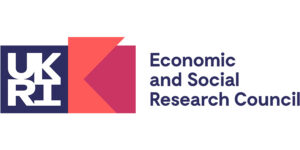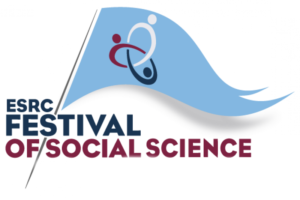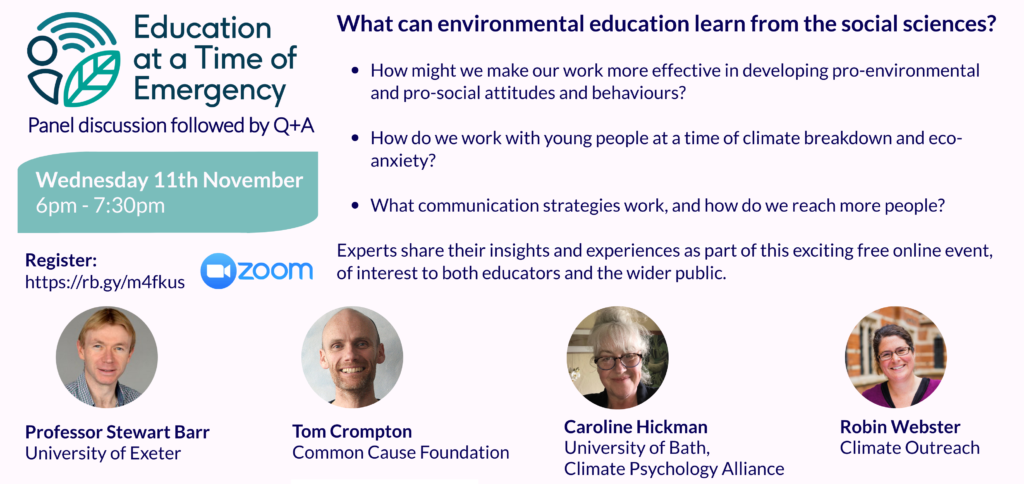



Stewart Barr graduated from the University of Exeter’s Geography Department in 1998 and continued his studies at Exeter undertaking a PhD exploring household waste practices. Building on this research, he worked for two years in the Department as a post-doctoral researcher on an ESRC-funded project entitled ‘Environmental Action in and Around the Home’. He became a Lecturer in Geography in 2003, Senior Lecturer in 2008, Associate Professor in 2012 and is now Professor of Geography. Within the Department Stewart undertakes research in the Environment and Sustainability and Spatial Responsibilities Research Groups and he teaches modules at all levels of undergraduate study.
I come from a natural science background but am compelled by the realisation that we cannot expect proportional or lasting responses to today’s profound social and environment challenges to emerge unless these responses are rooted in an understanding of people. By that I don’t just mean savvy communications approaches or an understanding of cognitive biases – important as those things might be. I mean something more fundamental: what matters to us, and what shapes what matters to us.
I have worked on values and social change for fifteen years, employed by or collaborating with diverse charities – including NSPCC, Oxfam, Scope and WWF. I have advised the UK, Scottish and Welsh governments on cultural values, and have collaborated and published with some of the world’s foremost academics working in this area. I’ve also written extensively in this field for both peer-reviewed and popular journals, and wrote the reports Weathercocks and Signposts: The Environment Movement at a Crossroads (WWF, 2007), Common Cause: The Case for Working with Values and Frames (WWF, 2010) and Perceptions Matter: The Common Cause UK Values Survey (CCF, 2016).
Resources:
Book: David Orr, Earth in Mind
Common Cause Communication: A Toolkit for Charities
Communicating Bigger-than-self Problems to Extrinsically-oriented Audiences
Caroline Hickman is a psychotherapist & lecturer at the University of Bath & a member of the Climate Psychology Alliance (CPA) for whom she has created several podcasts on eco-anxiety & psychotherapy, the climate and bio-diversity crisis and why some adults are reacting badly to youth climate strikers. She is currently researching children & young people’s feelings about the climate and biodiversity crisis to uncover and explore different stories, narratives and images around our defences against the ‘difficult truth’ of crises and hidden and ‘less conscious’ feelings about climate anxiety. She is passionate about getting ‘under the surface’ metaphorically and literally.
Resources:
Chapter in Hoggett, P. (Eds) Climate Psychology: On Indifference to Disaster (2019)
Tedx talk on climate change psychology
Robin leads the Advocacy Communications programme for Climate Outreach, focusing on providing civil society campaigners with knowledge, tools and research to help them engage all sorts of people on climate change. She loves working with campaigners for their resilience and positivity even when facing up to the world’s biggest challenge. She has been knocking around the environmental world for twenty years as a researcher, journalist and campaigner, first becoming interested in the disconnect between political debate about climate change and how we talk about it in real life whilst working as campaigner for Friends of the Earth. She helped to start up Carbon Brief when it began life as a climate science and energy blog and has spent more time than is healthy digging into the intricacies of climate policy, including as a researcher for the European Climate Foundation.
Robin has a Masters in Conservation from UCL and an undergraduate degree in Biology. She is the author of Climate Outreach’s #TalkingClimate handbook amongst many others, and has lived in the UK, USA, Uganda and Austria. In her spare time Robin hikes, swims, cycles and teaches and plays at comedy improv, which she thinks is the best art form in the world.
Resources:
Climate Outreach’s #TalkingClimate handbook
Theory of change: creating a social mandate for climate action
Conversations at a time of emergency
Overview
Conversations at a Time of Emergency is part of the 18 month South West practitioner facing project ‘Education at a Time of Emergency’. Both projects are funded by the Economic and Social Research Council, led by Professor Stewart Barr, and hosted by the University of Exeter’s Geography Department.
We recognise that at a time of climate and ecological emergency, environmental education practitioners are looking to innovate effective approaches and methodologies to encourage engaged citizenship and pro-environmental behaviours. Together these projects will provide environmental education practitioners with a platform for engaging with social science through a series of events, peer support and mentoring.
As part of this year’s ESRC Festival of Social Science, we will bring together a variety of perspectives to consider the role of environmental education and how we can best support the sector. An online panel discussion and immersive podcasts will bring together experienced researchers and practitioners from the field of behavioural change science, with a view to generating a robust theoretical and practical foundation for the new project.
The following thematic areas will be explored:
1. Nature Connection – current challenges and opportunities; stories from the field
2. Communication – what we can learn from the social sciences to become better equipped for the current emergencies
3. Foundations for change – bridging social science theory and applied best practice for effective responses
Events
How can we help environmental education to become effective at providing learners with experiences, knowledge and competencies which matter in today’s changing world?
We have invited a selection of researchers, communicators and practitioners to share their insights and experiences in these areas in the hope of learning from one another, and being these ideas to bear upon environmental education at a time of emergency.
Our first event was online panel discussion which took place on the 11th of November 2020.
Our speakers were Tom Crompton, Caroline Hickman and Robin Webster. The event was chaired by Professor Stewart Barr. You can view the recording of this event here.
To follow on from this we have planned a series of podcasts, beginning later this month, exploring in more depth some of the themes, topic and questions touched upon by our panelists and participants. We hope you enjoy these resources and please do get in touch if you have any suggestions or questions.

